Alicante, a captivating coastal city in southeastern Spain, invites you on an unforgettable journey through its storied past, breathtaking landscapes, and vibrant cultural tapestry. From its ancient roots to its modern-day allure, Alicante’s unique character unfolds in every corner, promising an experience that lingers long after your visit.
Nestled on the shores of the Mediterranean Sea, Alicante has witnessed centuries of history, leaving behind a rich legacy that permeates its very essence. Its strategic location has shaped its destiny, from the days of Roman conquest to its emergence as a thriving port city.
History of Alicante
Alicante’s history is rich and varied, dating back to the ancient Greeks who founded the city in the 4th century BC. The city has been ruled by many different empires over the centuries, including the Romans, Moors, and Spanish. Each empire has left its mark on the city, and Alicante today is a vibrant and cosmopolitan city with a unique blend of cultures.
Foundation and Early History
The earliest evidence of human habitation in the Alicante area dates back to the Paleolithic era. However, the city was not founded until the 4th century BC by the ancient Greeks. The Greeks named the city Akra Leuke, which means “White Rock.” The city was a major trading center for the Greeks, and it was also a center of culture and learning.
Alicante, a captivating coastal city in Spain, boasts a rich history and stunning beaches. Its vibrant atmosphere and Mediterranean charm make it a popular destination. If you’re seeking adventure beyond Alicante, consider exploring alaskausa , a land of majestic glaciers, towering mountains, and abundant wildlife.
After your Alaskan expedition, return to Alicante to savor its delightful cuisine, stroll through its charming streets, and bask in the warmth of the Spanish sun.
Roman Rule
The Romans conquered Alicante in the 2nd century BC. The city became a Roman colony and was renamed Lucentum. The Romans built a number of important buildings in Alicante, including a forum, an amphitheater, and a temple. Alicante was also a major center of trade for the Romans.
Moorish Rule
The Moors conquered Alicante in the 8th century AD. The city became a major center of Islamic culture and learning. The Moors built a number of mosques and palaces in Alicante, and they also introduced new crops and technologies to the city.
Spanish Rule
The Spanish reconquered Alicante in the 13th century AD. The city became a major center of the Spanish Empire. Alicante was a major port for the Spanish, and it was also a center of trade and commerce. The city was also a major center of culture and learning, and it was home to a number of universities and libraries.
Modern History
Alicante continued to be a major center of trade and commerce in the modern era. The city was also a major center of tourism. In the 19th century, Alicante became a popular destination for British tourists. The city was also a major center of the Spanish Civil War. Alicante was heavily bombed during the war, and much of the city was destroyed. However, the city was rebuilt after the war, and it is now a thriving and modern city.
Significance of Alicante’s Location on the Mediterranean Sea
Alicante’s location on the Mediterranean Sea has been a major factor in its history. The city has been a major trading center for centuries, and it has also been a major center of tourism. Alicante’s location has also made it a strategic military location. The city has been conquered by many different empires over the centuries, and it has been a major battleground in many wars.
Geography of Alicante
Alicante, a captivating city in southeastern Spain, boasts a rich tapestry of geographical features that shape its landscape, economy, and culture.
Nestled along the Mediterranean Sea, Alicante is framed by a stunning coastline punctuated by sandy beaches, rocky cliffs, and picturesque coves. The city’s skyline is dominated by Mount Benacantil, a towering limestone formation that serves as a prominent landmark. The surrounding Serra Grossa mountain range adds to the region’s scenic beauty, offering panoramic views of the city and its surroundings.
Alicante’s hydrography is characterized by the Segura River, which flows through the city and provides a vital water source for the region. Numerous smaller rivers and streams traverse the landscape, contributing to the city’s lush vegetation and fertile agricultural lands.
The Mediterranean climate of Alicante is characterized by warm, dry summers and mild, rainy winters. This favorable climate has significantly influenced the city’s economy and culture, attracting tourists and fostering a thriving agricultural industry.
Mountains of Alicante
Alicante’s mountainous terrain is a defining feature of its geography. Mount Benacantil, the city’s iconic landmark, rises 166 meters above sea level and offers breathtaking views of the surrounding area. The Serra Grossa mountain range, located to the north of the city, is a popular hiking and cycling destination, providing a scenic escape from the urban hustle and bustle.
Coastline of Alicante
The Mediterranean Sea forms the southern boundary of Alicante, shaping its coastline and influencing its economy and culture. The city’s beaches are a major tourist attraction, with Postiguet Beach being the most popular. Other notable beaches include Albufereta Beach and San Juan Beach. The rocky cliffs and coves along the coastline provide opportunities for snorkeling, diving, and fishing.
Rivers of Alicante
The Segura River is the most significant river in Alicante, providing water for irrigation and supporting the region’s agricultural industry. Other notable rivers include the Vinalopó River and the Amadorio River. These rivers contribute to the city’s lush vegetation and create fertile agricultural lands.
Climate of Alicante
Alicante enjoys a Mediterranean climate, characterized by warm, dry summers and mild, rainy winters. The average temperature in summer ranges from 25 to 30 degrees Celsius, while in winter it drops to around 10 to 15 degrees Celsius. The city receives an average of 300 sunny days per year, making it a popular destination for sun-seekers and outdoor enthusiasts.
Economy of Alicante
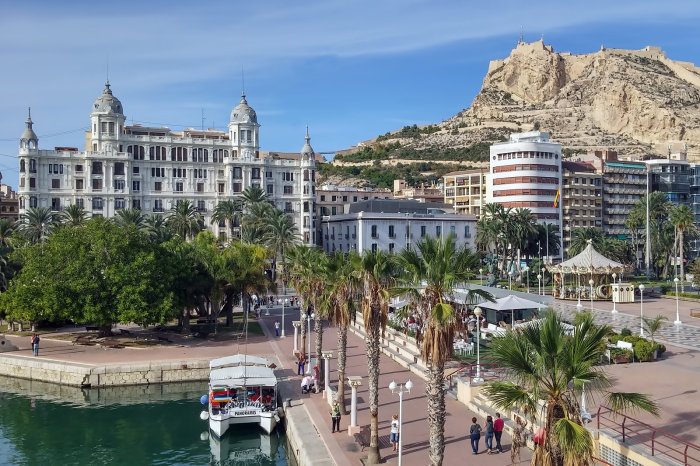
Alicante’s economy is diverse, with major industries including tourism, agriculture, and manufacturing. The city is a popular tourist destination, attracting millions of visitors each year. Tourism contributes significantly to Alicante’s economy, providing employment and revenue for businesses in the hospitality, retail, and transportation sectors.
Agriculture is another important industry in Alicante. The city is known for its production of citrus fruits, including oranges, lemons, and grapefruits. Alicante also produces a variety of vegetables, including tomatoes, peppers, and onions. Manufacturing is also a significant industry in Alicante. The city is home to a number of factories that produce a variety of goods, including food, beverages, and textiles.
In recent years, Alicante’s economy has grown steadily. The city’s unemployment rate has declined, and the number of businesses has increased. However, Alicante’s economy still faces a number of challenges. These challenges include the high cost of living, the lack of affordable housing, and the need for more investment in infrastructure.
Despite these challenges, Alicante’s economy is expected to continue to grow in the coming years. The city’s strong tourism industry and its growing manufacturing sector are expected to drive economic growth. Additionally, Alicante is expected to benefit from the development of new infrastructure projects, such as the new airport terminal and the high-speed rail line.
Tourism
Tourism is Alicante’s largest industry, accounting for over 20% of the city’s GDP. The city is a popular destination for both domestic and international tourists, who are attracted by its beautiful beaches, its historic center, and its vibrant nightlife. Alicante is also home to a number of museums and art galleries, as well as a variety of shops and restaurants.
Agriculture
Agriculture is another important industry in Alicante, accounting for about 10% of the city’s GDP. The city is known for its production of citrus fruits, including oranges, lemons, and grapefruits. Alicante also produces a variety of vegetables, including tomatoes, peppers, and onions.
Manufacturing
Manufacturing is also a significant industry in Alicante, accounting for about 15% of the city’s GDP. The city is home to a number of factories that produce a variety of goods, including food, beverages, and textiles.
Culture of Alicante
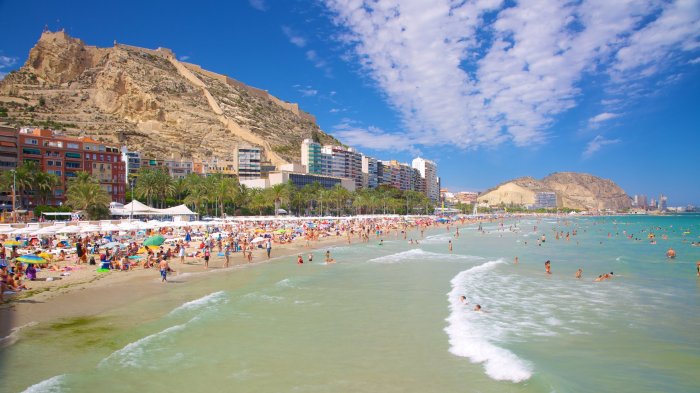
Alicante’s culture is a vibrant tapestry woven from the threads of its rich history and diverse geography. The city’s unique blend of Spanish, Valencian, and Moorish influences has shaped its festivals, traditions, and cuisine, creating a cultural landscape that is both distinctive and captivating.
Festivals and Traditions
Alicante’s calendar is punctuated by a lively array of festivals and traditions that reflect the city’s deep-rooted heritage. The most famous of these is the Bonfires of San Juan, held annually on June 24th. During this spectacular event, giant papier-mâché figures known as “ninots” are paraded through the streets before being burned in a bonfire on the beach, symbolizing the purification of the city and the arrival of summer.
Other notable festivals include the Moors and Christians Festival, which commemorates the Reconquista, and the Holy Week processions, which showcase elaborate religious floats and penitents in colorful robes.
Cuisine
Alicante’s cuisine is a culinary symphony that harmonizes the flavors of the sea, the land, and the city’s multicultural heritage. Fresh seafood, such as red mullet and sea bass, is a staple of many dishes, while traditional Valencian rice dishes like paella and fideuà are also widely enjoyed.
The city’s proximity to the sea has also influenced its cuisine, with dishes like “caldero,” a fish stew, and “salazones,” salted fish, being popular local specialties. Alicante’s sweet treats are equally delectable, with “turrón,” a nougat made from honey, almonds, and sugar, being a particular favorite.
Tourism in Alicante
Alicante is a popular tourist destination in Spain, known for its beautiful beaches, museums, and historical sites. The city attracts millions of visitors each year, who come to enjoy the Mediterranean climate, the vibrant culture, and the many attractions that Alicante has to offer.
Major Tourist Attractions
Some of the most popular tourist attractions in Alicante include:
- The beaches: Alicante has a number of beautiful beaches, including Postiguet Beach, San Juan Beach, and Albufereta Beach. These beaches are popular for swimming, sunbathing, and water sports.
- The museums: Alicante has a number of museums, including the Museum of Contemporary Art (MACA), the Archaeological Museum of Alicante (MARQ), and the Museum of Fine Arts (MUBAG). These museums offer a variety of exhibits on art, history, and culture.
- The historical sites: Alicante has a number of historical sites, including the Santa Barbara Castle, the Town Hall, and the Procathedral of San Nicolas. These sites offer a glimpse into the city’s rich history.
Impact of Tourism
Tourism has a significant impact on Alicante’s economy and culture. The city’s tourism industry employs thousands of people and generates millions of euros in revenue each year. Tourism also helps to promote Alicante’s culture and heritage, and it has helped to make the city a more cosmopolitan and vibrant place.
Map of Alicante’s Tourist Attractions
The following map shows the location of Alicante’s major tourist attractions:
[Provide a map of Alicante’s tourist attractions with labels for each major landmark.]
Transportation in Alicante
Alicante’s transportation system is well-developed, offering various options for both residents and tourists. The city is served by an international airport, a central train station, and an extensive bus network.
The Alicante-Elche Airport (ALC) is located 9 kilometers southwest of the city center and offers connections to major cities in Spain, Europe, and beyond. The airport is accessible by bus, taxi, or rental car.
Train Station
The Alicante-Terminal railway station is located in the heart of the city and serves as a hub for regional and national train services. High-speed AVE trains connect Alicante to Madrid, Barcelona, and other major cities in Spain.
Bus Network
Alicante’s bus network is operated by TAM (Transportes Alicante Metropolitano) and provides extensive coverage throughout the city and surrounding areas. The bus system includes regular routes, express lines, and night buses.
Challenges and Opportunities
While Alicante’s transportation system is generally efficient, there are some challenges that need to be addressed. These include:
- Traffic congestion during peak hours
- Limited parking availability in the city center
- Need for improved public transportation connections to outlying areas
Despite these challenges, Alicante’s transportation system has several opportunities for improvement. These include:
- Expansion of the bus network to underserved areas
- Introduction of new technologies to improve traffic flow
- Investment in sustainable transportation options, such as electric buses and bike lanes
Education in Alicante
Alicante, a thriving city on Spain’s southeastern coast, boasts a comprehensive education system that encompasses schools, universities, and research institutions. The city is committed to providing high-quality education for its residents, fostering a culture of academic excellence and innovation.
Schools in Alicante
Alicante’s primary and secondary education system is well-established, with numerous public and private schools catering to students from kindergarten to high school. The city places a strong emphasis on early childhood education, recognizing its importance in laying a solid foundation for future learning. Schools in Alicante offer a well-rounded curriculum that includes core subjects such as mathematics, science, language, and history, as well as extracurricular activities like sports, music, and art.
Universities in Alicante
Alicante is home to several renowned universities, including:
- University of Alicante (UA): A comprehensive public university with a strong focus on research and innovation. UA is ranked among the top universities in Spain and is particularly well-known for its programs in science, technology, and engineering.
- Miguel Hernandez University of Elche (UMH): Another public university located in the nearby city of Elche. UMH offers a wide range of undergraduate and graduate programs in fields such as health sciences, social sciences, and humanities.
- Catholic University of Valencia San Vicente Mártir (UCV): A private university with a campus in Alicante. UCV offers programs in law, business, and education, among others.
Research Institutions in Alicante
Alicante is also home to several research institutions, including:
- Instituto de Astrofísica de Canarias (IAC): A renowned research institute specializing in astrophysics. IAC has a presence in Alicante and is involved in cutting-edge research in astronomy and astrophysics.
- Instituto de Investigación Sanitaria y Biomédica de Alicante (ISABIAL): A biomedical research institute focused on translational research and innovation in health sciences. ISABIAL collaborates with hospitals and universities in Alicante to advance medical knowledge and improve patient care.
Challenges and Opportunities in Alicante’s Education System
While Alicante’s education system is generally well-regarded, it faces some challenges, including:
- Access to Higher Education: Despite the presence of several universities, the number of students admitted to higher education in Alicante is lower than the national average.
- Language Barriers: Alicante is a bilingual region, with Spanish and Valencian being the official languages. Some students may face challenges in accessing education in their preferred language.
- Funding: Like many education systems, Alicante’s faces ongoing challenges in securing adequate funding to meet the growing needs of its students and institutions.
Despite these challenges, Alicante’s education system also presents several opportunities:
- International Collaboration: Alicante’s universities have established partnerships with institutions worldwide, providing students with opportunities for international exchange and research collaboration.
- Entrepreneurial Spirit: Alicante is home to a vibrant entrepreneurial ecosystem, which provides students with opportunities to develop their business and innovation skills.
- Growing Research Hub: The presence of research institutions and the city’s commitment to innovation create a fertile environment for research and development.
Overall, Alicante’s education system is a dynamic and evolving landscape that strives to provide its students with the knowledge, skills, and opportunities they need to succeed in a rapidly changing world.
Alicante, a vibrant city on Spain’s southeastern coast, is renowned for its rich cultural heritage. Its annual festivals, such as the renowned Bonfires of San Juan, showcase the city’s unique traditions. If you’re seeking an immersive cultural experience, explore best cultural festivals worldwide to discover other captivating celebrations.
Upon your return to Alicante, delve into the city’s own cultural tapestry, where ancient customs intertwine with modern festivities.
Healthcare in Alicante
Alicante’s healthcare system is a comprehensive network of hospitals, clinics, and pharmacies that provide a wide range of medical services to the city’s residents and visitors. The system is overseen by the Valencian Health Service (Servicio Valenciano de Salud), which is responsible for planning, funding, and managing healthcare services in the region.
Alicante has a number of major hospitals, including the Hospital General Universitario de Alicante, the Hospital Universitario San Juan de Alicante, and the Hospital Universitario Dr. Balmis. These hospitals provide a full range of medical services, including emergency care, surgery, and specialized treatment for a variety of conditions.
In addition to hospitals, Alicante also has a number of clinics and health centers that provide primary care services, such as checkups, vaccinations, and minor medical procedures. These clinics are typically located in neighborhoods throughout the city, making it easy for residents to access healthcare services.
Alicante’s healthcare system is generally considered to be of high quality. The city’s hospitals and clinics are well-equipped and staffed with experienced medical professionals. However, the system does face some challenges, including long wait times for appointments and a shortage of doctors in some specialties.
Challenges and Opportunities
The healthcare system in Alicante faces a number of challenges, including:
- Long wait times for appointments: Patients often have to wait several weeks or even months for an appointment with a specialist.
- Shortage of doctors in some specialties: There is a shortage of doctors in some specialties, such as psychiatry and oncology.
- Aging population: Alicante’s population is aging, which is putting a strain on the healthcare system.
Despite these challenges, the healthcare system in Alicante also has a number of opportunities for improvement.
- Investment in new technology: The healthcare system in Alicante could be improved by investing in new technology, such as electronic health records and telemedicine.
- Increased training for healthcare professionals: The healthcare system in Alicante could be improved by increasing training for healthcare professionals, particularly in specialties where there is a shortage of doctors.
- Improved coordination between different healthcare providers: The healthcare system in Alicante could be improved by improving coordination between different healthcare providers, such as hospitals, clinics, and pharmacies.
By addressing these challenges and seizing these opportunities, the healthcare system in Alicante can be improved to meet the needs of the city’s residents and visitors.
Alicante is a captivating coastal city in Spain, renowned for its pristine beaches and vibrant nightlife. For nature enthusiasts, a visit to the renowned arboretum dallas in Texas is a must. This sprawling botanical garden showcases a diverse collection of trees and plants from around the world, providing a serene escape amidst the bustling city.
Returning to Alicante, visitors can bask in the Mediterranean sun on Postiguet Beach or explore the historic Santa Barbara Castle, offering breathtaking views of the surrounding landscape.
Sports in Alicante
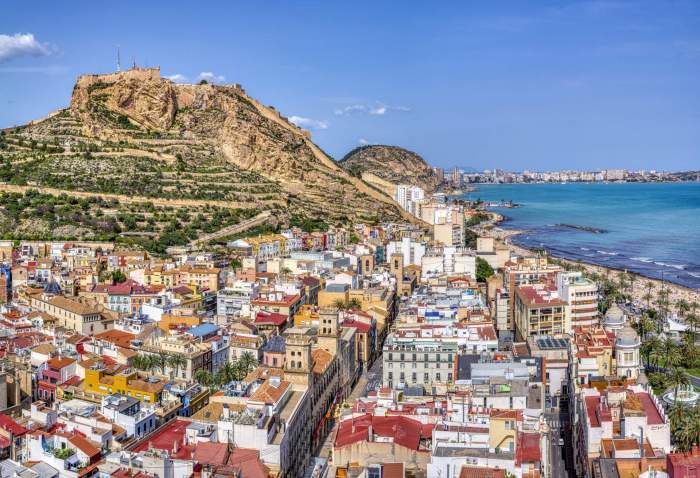
Alicante, a coastal city in southeastern Spain, is home to a thriving sports scene. The city boasts several major sports teams and venues, and sports play an important role in the daily lives of many residents.
Football
Football is the most popular sport in Alicante, and the city is home to two professional football clubs: Hércules CF and Intercity CF. Hércules CF, founded in 1922, is the most successful club in the city, having played in La Liga, the top division of Spanish football, for several seasons. Intercity CF, founded in 2017, is a rising star in Spanish football and currently plays in the Segunda División RFEF, the third tier of Spanish football.
Basketball
Basketball is another popular sport in Alicante, and the city is home to two professional basketball clubs: Lucentum Alicante and CB Alicante. Lucentum Alicante, founded in 1994, is the most successful basketball club in the city, having played in the Liga ACB, the top division of Spanish basketball, for several seasons. CB Alicante, founded in 2019, is a newer club that currently plays in the LEB Plata, the third tier of Spanish basketball.
Handball
Handball is a popular team sport in Alicante, and the city is home to one professional handball club: BM Benidorm. BM Benidorm, founded in 1999, is one of the top handball clubs in Spain and currently plays in the Liga Asobal, the top division of Spanish handball.
Sports Venues
Alicante is home to several major sports venues, including:
- Estadio José Rico Pérez: The home stadium of Hércules CF, with a capacity of 30,000.
- Pabellón Pedro Ferrándiz: The home arena of Lucentum Alicante, with a capacity of 5,500.
- Palau d’Esports de Benidorm: The home arena of BM Benidorm, with a capacity of 3,000.
Challenges and Opportunities
The sports industry in Alicante faces several challenges, including:
- Funding: Many sports clubs in Alicante struggle to secure adequate funding, which can limit their ability to compete at a high level.
- Infrastructure: Some sports venues in Alicante are in need of upgrades and improvements to meet the needs of modern athletes and fans.
Despite these challenges, there are also several opportunities for growth in the sports industry in Alicante. The city’s warm climate and beautiful scenery make it an ideal destination for sports tourism. Additionally, the city’s growing population and increasing interest in sports provide a strong foundation for the future of sports in Alicante.
Future of Alicante
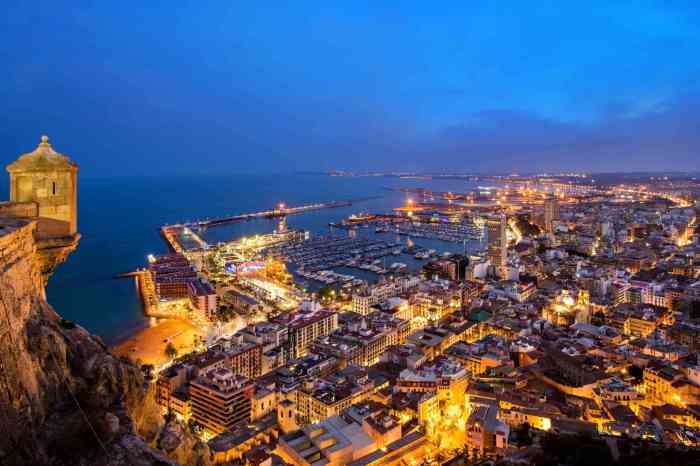
Alicante faces a bright future with ample opportunities for economic growth, social progress, and environmental sustainability. Embracing technology, innovation, and sustainability will be crucial in shaping Alicante’s future.
Economic Challenges and Opportunities
Alicante’s economy relies heavily on tourism and services. Diversifying the economy by attracting new industries and businesses is essential for sustainable growth. The city also needs to address income inequality and provide affordable housing for its residents.
Social Challenges and Opportunities
Alicante is a diverse city with a growing population. The city needs to promote social inclusion and provide equal opportunities for all its residents. Investing in education and healthcare will be crucial for improving the well-being of Alicante’s citizens.
Environmental Challenges and Opportunities
Alicante’s beautiful coastline and natural environment are key assets for the city. However, the city faces challenges such as pollution, climate change, and water scarcity. Implementing sustainable practices and investing in renewable energy will be essential for protecting Alicante’s environment.
Vision for Alicante’s Future
Alicante’s future should be characterized by economic prosperity, social inclusivity, and environmental sustainability. The city should be a hub for innovation and technology, with a thriving economy that provides opportunities for all its residents. Alicante should also be a leader in sustainability, with a clean and healthy environment for generations to come.
Steps to Achieve the Vision, Alicante
Achieving Alicante’s vision will require a concerted effort from all stakeholders, including the government, businesses, and citizens. The city needs to invest in infrastructure, education, and healthcare. It also needs to promote innovation and sustainability. By working together, Alicante can create a bright future for its residents.
Final Summary
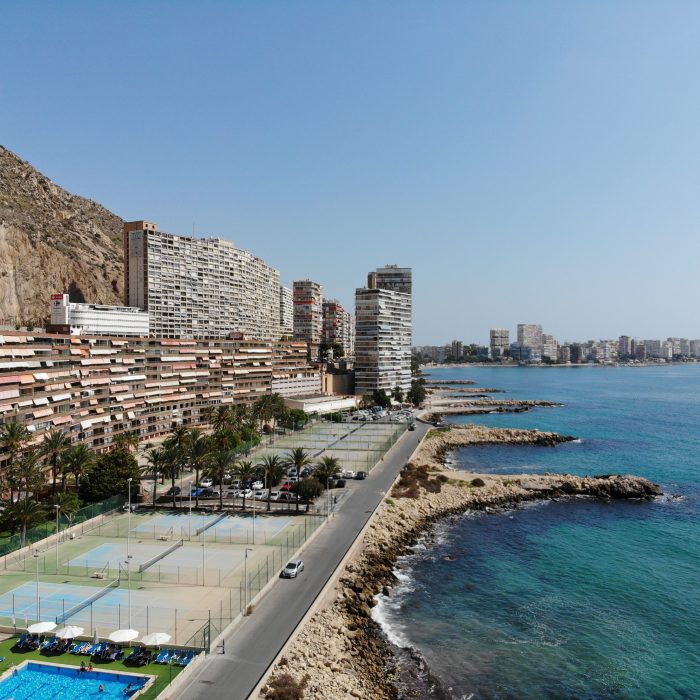
As we bid farewell to Alicante, we carry with us a profound appreciation for its timeless beauty and enduring spirit. This coastal gem has left an indelible mark on our hearts, reminding us of the power of history, the allure of culture, and the enduring charm of the Mediterranean.
Alicante’s future holds infinite promise, as it continues to embrace innovation while preserving its rich heritage. Its vibrant spirit and unwavering optimism ensure that this captivating city will continue to captivate visitors for generations to come.
Query Resolution
What is Alicante famous for?
Alicante is renowned for its stunning beaches, historic castle, vibrant nightlife, and delicious cuisine.
What is the best time to visit Alicante?
The best time to visit Alicante is during the shoulder seasons (April-May and September-October) when the weather is pleasant and there are fewer crowds.
Is Alicante a safe city?
Yes, Alicante is generally considered a safe city with a low crime rate.